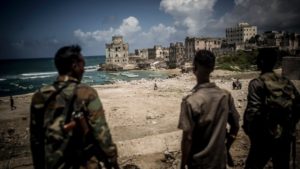THE BUSINESS OF FEAR IN BOOMTOWN MOGADISHU
07/11/2017 12:34

The first courses had just been served when the war came to the country club in Mogadishu. Fifty guests, including businesspeople and government officials, were sitting at long tables laden with bowls of camel stew, goat meat, lobster and swordfish. When a van filled with explosives detonated in front of the gate, the resulting explosion demolished part of the protective wall, blew the second floor right off the villa and destroyed the building’s entire front.
Four attackers then fired at the country club’s security staff with assault rifles and, when they returned fired, stormed a nearby restaurant. By the time the last fighter was finally shot dead 12 hours later, three gunmen and 16 guests had been killed.
Six weeks later, no traces of the attack remain. It is a Monday morning, and Manar Moalin is waiting for her guests. Standing on a turret by the entrance, the 33-year-old with red lipstick and golden eyeshadow watches as an armored vehicle drives around the concrete barriers while the heavily armed security guards in front of her country club relax in the shade and chew khat.
A wall of sand and cement 2.5 meters (8 feet) thick now protects the club while the villa is once again resplendent in fresh white. Coconut palms and rubber trees hem in two open-walled huts covered in palm fronds. Mogadishu’s country club is a cross between a palace, a fortress and a wooden shack, but above all else it is a refuge for high-ranking government officials, businesspeople and the city’s wealthy. It is perhaps the weirdest place in Mogadishu, capital of the most failed of states. For 27 years, the country has made due without a government able to exert its control across all parts of the country – and it has been at war for three decades.
Warlords and dubious businessmen are in power here, in addition to al-Shabaab, the al-Qaida allies who are responsible for the deaths of 4,200 people in the past year alone. The recent attack in mid-October, in which over 300 people died, has also been attributed to the terror group. And yet Mogadishu is booming. The city is a metropolis of fear, its business model is chaos.
Manar Moalin leaves her lookout point and perches on a kind of wooden throne in the garden. A pair of dwarf antelopes tremble in the wind, a giant tortoise inches past. Moalin has tied a blue headscarf around her head like a pirate and is wearing a cobalt-blue shirt under a black vest, tight jeans, a gold nose-ring. The dry sound of a machine-gun salvo drifts past. “This is how things go here,” she said, and points to the most recent traces of destruction.
Moalin’s voice sounds young, raw, like London’s West End. She grew up in Italy, studied economics in London, and went on to run a luxury spa in Dubai. It was a good life, but then her mother was drawn back to Mogadishu, and Moalin also began to feel like it was time to return to the city of her birth. She came for an initial visit, then came for weekend parties, then back forever. Almost three years ago, in December of 2014, she opened her club.
In the first year, she came close to a breakdown. In Mogadishu, everyone needs allies, but Moalin didn’t have any. Her competitors had her club stormed by the intelligence service, a couple of clan leaders from the neighborhood had a private army march out front, she was threatened, denounced and robbed. She has had a gun pointed at her forehead more than once. It took her 12 months to learn the rules. “I have lost my freedom, my peace and my health,” she says. “I cannot wear what I want, I cannot go where I want. I live in a fortress that I barely leave.” But she still has no intention of moving away.
Her brother has come twice to try to bring her back to Dubai. Her children wanted her back, as does her husband. But Moalin remains. Out of defiance. And because she wants to help her homeland take a step forward.
“At this point, it’s less about money for me than about principles,” she says. Like many returnees, she doesn’t want to let herself be driven out again. But it’s also about money, of course. “You can get rich here like nowhere else,” she says.
Money also played a role in the attack on her club. Moalin says she doesn’t pay any protection money, which was one reason. The other was that businesspeople from the neighborhood wanted to take over her club, and supposedly hired the Shabaab fighters to stage the attack.
———
Back